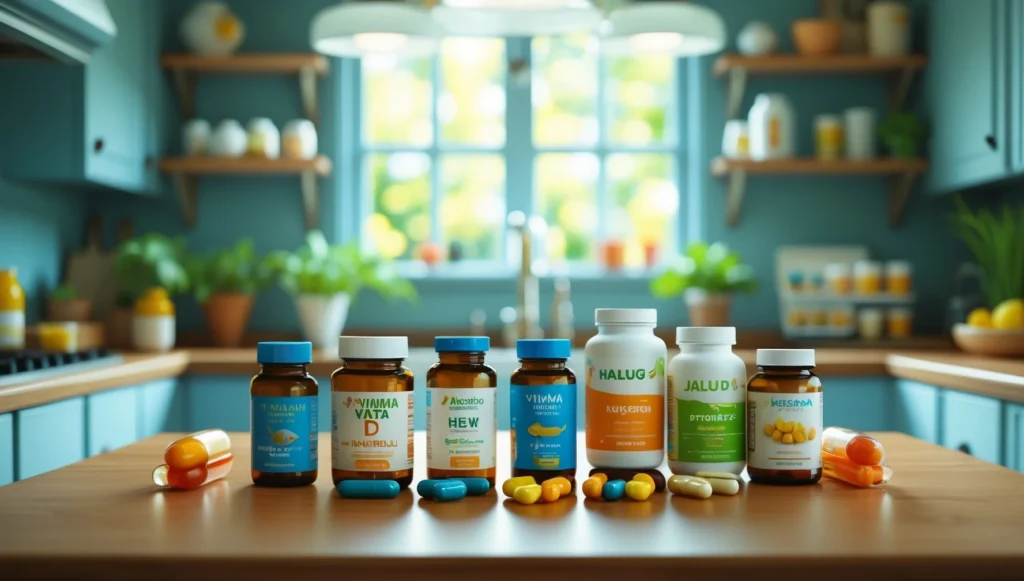As men age, their bodies require specific vitamins and nutrients to maintain optimal health. these essential vitamins support everything from bone density and immune function to energy levels and mental clarity. in this guide, we’ll explore the key vitamins aging men need, their benefits, and how to incorporate them into your diet.
Why Are Vitamins Important for Aging Men?
The body’s ability to absorb nutrients decreases with age, making it crucial to prioritize vitamin intake. deficiencies can lead to fatigue, weakened immunity, and an increased risk of chronic diseases. ensuring adequate vitamin levels helps promote longevity and vitality.
Common Nutritional Challenges After 50
- Decreased Absorption: The digestive system becomes less efficient at absorbing certain nutrients.
- Reduced Appetite: Lower food intake can lead to insufficient nutrient consumption.
- Medication Interactions: Some medications interfere with vitamin absorption.
“proper nutrition is the foundation of healthy aging—vitamins play a vital role in maintaining balance.”
Essential Vitamins for Aging Men
Here are the most important vitamins for men over 50, along with their benefits and food sources.

1. Vitamin D
Vitamin D is critical for bone health, immune function, and mood regulation. low levels are linked to osteoporosis, depression, and increased susceptibility to infections.
Benefits of Vitamin D
- Supports calcium absorption for strong bones.
- Reduces the risk of fractures and falls.
- Enhances immune system performance.
Food Sources
- Fatty fish like salmon, mackerel, and sardines.
- Fortified dairy products and plant-based milks.
- Egg yolks and mushrooms exposed to sunlight.
Supplementation Tips
- Consider a daily supplement of 1,000-2,000 IU if sunlight exposure is limited.
- Consult a doctor to check vitamin D levels through a blood test.
2. Vitamin B12
Vitamin B12 is essential for red blood cell production, nerve function, and DNA synthesis. aging men often experience reduced absorption of this vitamin due to changes in stomach acid production.
Benefits of Vitamin B12
- Prevents anemia and fatigue.
- Supports brain health and cognitive function.
- Aids in energy metabolism.
Food Sources
- Lean meats like beef, lamb, and pork.
- Fish and shellfish, especially clams and trout.
- Fortified cereals and nutritional yeast.
Supplementation Tips
- Older adults may benefit from sublingual (under-the-tongue) or injectable B12 supplements.
- Look for methylcobalamin, the active form of B12, for better absorption.

3. Vitamin C
Vitamin C is a powerful antioxidant that supports immune health, collagen production, and skin integrity. it also aids in iron absorption and reduces inflammation.
Benefits of Vitamin C
- Boosts immune system defenses.
- Promotes wound healing and tissue repair.
- Protects against oxidative stress and aging.
Food Sources
- Citrus fruits like oranges, lemons, and grapefruits.
- Bell peppers, strawberries, and kiwis.
- Leafy greens like spinach and kale.
Supplementation Tips
- Aim for 75-90 mg per day, but avoid excessive doses that may cause kidney stones.
- Combine vitamin C-rich foods with iron-rich foods for better absorption.
4. Vitamin E
Vitamin E is another potent antioxidant that protects cells from damage and supports heart and brain health. it also promotes healthy skin and vision.
Benefits of Vitamin E
- Reduces inflammation and oxidative stress.
- Lowers the risk of heart disease and cognitive decline.
- Improves skin hydration and elasticity.
Food Sources
- Nuts and seeds like almonds, sunflower seeds, and hazelnuts.
- Vegetable oils such as sunflower and safflower oil.
- Green leafy vegetables like spinach and broccoli.
Supplementation Tips
- Stick to the recommended daily allowance (RDA) of 15 mg to avoid toxicity.
- Choose natural forms of vitamin E (d-alpha-tocopherol) for better bioavailability.
5. Vitamin K
Vitamin K is essential for blood clotting and bone health. it works synergistically with vitamin D to support calcium utilization in bones.
Benefits of Vitamin K
- Reduces the risk of fractures and osteoporosis.
- Ensures proper blood clotting to prevent excessive bleeding.
- Supports cardiovascular health by preventing arterial calcification.
Food Sources
- Leafy greens like kale, collard greens, and Swiss chard.
- Fermented foods like natto and sauerkraut.
- Broccoli, Brussels sprouts, and cabbage.
Supplementation Tips
- Look for vitamin K2 (menaquinone) for better bone and heart health benefits.
- Avoid high doses if you’re on blood-thinning medications like warfarin.
6. Magnesium
Magnesium plays a role in over 300 biochemical reactions in the body, including muscle function, sleep regulation, and energy production. many aging men are deficient in this mineral.
Benefits of Magnesium
- Supports muscle relaxation and prevents cramps.
- Improves sleep quality and reduces insomnia.
- Regulates blood pressure and blood sugar levels.
Food Sources
- Nuts and seeds like almonds, cashews, and pumpkin seeds.
- Whole grains like brown rice, quinoa, and oats.
- Dark chocolate and avocados.
Supplementation Tips
- Consider magnesium glycinate for better absorption and calming effects.
- Avoid excessive doses that may cause diarrhea or digestive upset.
7. Omega-3 Fatty Acids
While not a vitamin, omega-3 fatty acids are essential fats that reduce inflammation, support brain health, and improve heart function. they’re particularly important for aging men.
Benefits of Omega-3s
- Lowers triglycerides and reduces the risk of heart disease.
- Supports cognitive function and memory retention.
- Reduces joint pain and stiffness caused by arthritis.
Food Sources
- Fatty fish like salmon, mackerel, and sardines.
- Flaxseeds, chia seeds, and walnuts.
- Algal oil for a plant-based omega-3 option.
Supplementation Tips
- Aim for 250-500 mg of combined EPA and DHA daily.
- Choose high-quality fish oil or algae-based supplements to avoid contaminants.
How to Incorporate These Vitamins Into Your Diet
Getting essential vitamins through whole foods is ideal, but supplements can help fill gaps in your nutrition. here are some practical tips:
1. Eat a Balanced Diet
Focus on nutrient-dense foods like fruits, vegetables, lean proteins, whole grains, and healthy fats. variety ensures you’re getting a wide range of vitamins.
2. Take a Multivitamin
A high-quality multivitamin tailored for men over 50 can provide a baseline of essential nutrients. look for one that includes vitamin D, B12, and magnesium.
3. Cook with Healthy Oils
Use olive oil, avocado oil, or flaxseed oil in cooking to boost your intake of fat-soluble vitamins like vitamin E and K.
4. Stay Hydrated
Proper hydration supports digestion and nutrient absorption. drink plenty of water throughout the day.
Frequently Asked Questions About Vitamins for Aging Men
Can I Get All My Vitamins from Food?
While a balanced diet provides most essential nutrients, aging men may need supplements to address specific deficiencies or absorption issues.
Are Multivitamins Safe?
Yes, but choose reputable brands and avoid exceeding recommended doses. consult a healthcare provider before starting any new supplement regimen.
What Should I Look for in a Supplement?
Look for third-party testing, clear labeling, and avoidance of unnecessary additives or fillers.
How Do I Know If I’m Deficient?
Symptoms like fatigue, brittle nails, hair loss, or frequent illness may indicate deficiencies. a blood test can confirm specific nutrient levels.



